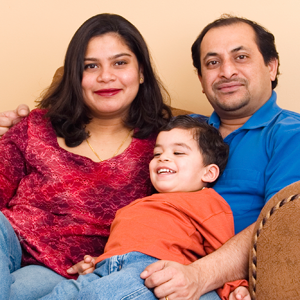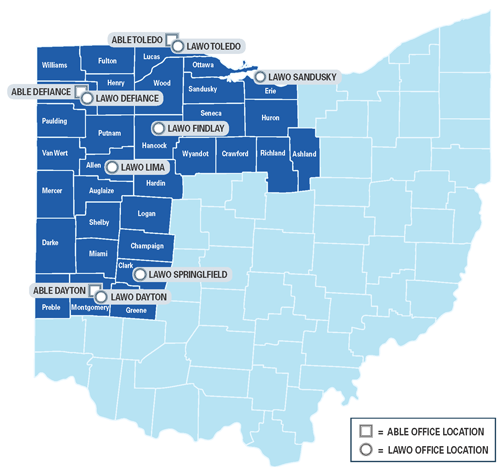A BRIEF HISTORY
The history of civil legal aid in northwest and west central Ohio starts with the founding of the Toledo Legal Aid Society in 1950. TLAS marks the first formal recognition in this area that - to have equal justice under the law - people living in poverty need access to attorneys. Over the next 20+ years, that recognition spread to other parts of our 32 county service area, including Dayton, with the founding of the Legal Aid Society of Dayton in 1967; Lima, with the founding of the Allen County-Blackhoof Legal Services Association in 1969; and Springfield, with the founding of the Rural Legal Aid Society of West Central Ohio in 1978.
Between 2001 and 2004, the Civil Division of the Toledo Legal Aid Society and the other organizations became part of Legal Aid of Western Ohio (LAWO) and its partner law firm, Advocates for Basic Legal Equality, Inc. (ABLE). LAWO proudly carries on the tradition of providing legal services as a nonprofit law firm charged with ensuring that the most vulnerable people in our communities have the same access to justice as people and companies who can afford to hire an attorney.
LAWO works closely with ABLE, which was founded in 1969. LAWO and ABLE are the only law firms that provide comprehensive legal representation in non-criminal matters for more than 500,000 people who are living, working, and raising their families in poverty in Northwest and West Central Ohio.
LAWO advocates for - and with - financially disadvantaged individuals and communities to protect and empower themselves, their households, and their neighbors. We work with our clients and communities to attack the root causes of poverty: housing, access to education and employment, financial instability, and domestic violence.
OUR IMPACT IN COMMUNITIES
LAWO provides legal services to people living, working, and raising their families in poverty in your community. Our impact goes far beyond providing an attorney for our clients. Through our efforts we:
- Create economic and housing stability by ensuring that families have access to safe and stable housing and can defend against unwarranted evictions and unscrupulous lending schemes
- Keep Ohioans working by helping people remove barriers to employment caused by earlier involvement with the criminal justice system
- Increase public safety by helping individuals and families access protection from domestic abuse and human trafficking
- Build collaborative networks to provide holistic services to domestic violence survivors and create a coordinated community response to domestic violence, dating violence, sexual abuse, and stalking
- Ensure the independence and self-determination of seniors by protecting their rights, empowering them to protect their rights themselves, and connecting them to critical information and helpful resources
- Promote healthy people and communities by working with health care providers and their patients to resolve conditions, such as unsanitary housing, that an attorney can remedy.
- Protect agricultural workers’ access to safe living and working conditions.
- Keep children in school and help them receive the special education services they need to succeed.
- Combat fraud and protect consumers in the marketplace
The Impact of LAWO
In 2022, LAWO received 12,550 requests for legal assistance and closed 4,701 cases.
- These cases helped protect and stabilize more than 14,281 low-income people
- Over $5 million in monetary awards for clients supported Medicaid coverage, housing assistance, bankruptcy discharges, and other case outcomes that allowed people to stabilize their financial circumstances and spend money in their local communities for food, transportation, and other necessities.

Who is eligible for legal aid services provided by LAWO?
Individuals or groups of individuals living in 32 counties of western and west-central Ohio who meet financial eligibility requirements based on federal poverty guidelines and other special factors will generally be eligible for assistance. We have dedicated funding to serve domestic violence survivors and seniors who may have income or assets that exceed those guidelines. Our agricultural worker program serves all 88 Ohio counties. Our current funding allows to us serve only some of those who apply and qualify financially for assistance. We have established case priorities based on periodic assessments of the legal needs of our client communities. We provide legal education and pro se materials whenever possible to those for whom we cannot assign an attorney.
How can a person apply for help? Go to Legalaidline.org
Online intake services are available in English and Spanish.
Or contact the Legal Aid Line by phone:
- New inquiries from Lucas County can call (419) 724-0460
- Outside of Lucas County, call toll-free at (888) 534-1432 (residents of Allen, Ashland, Auglaize, Champaign, Clark, Crawford, Darke, Defiance, Erie, Fulton, Greene, Hancock, Hardin, Henry, Huron, Logan, Mercer, Miami, Montgomery, Ottawa, Paulding, Preble, Putnam, Richland, Sandusky, Seneca, Shelby, Van Wert, Williams, Wood, and Wyandot counties)
Intake specialists taking applications by phone are bilingual in English and Spanish. Translation assistance is available for other languages.
LAWO believes eligible persons should have equal access to LAWO’s legal services. LAWO believes in delivering legal services to eligible persons equally. LAWO does not treat eligible persons differently on the basis of ethnicity, race, religion, color, creed, sex, age marital status, national origin, ancestry, sexual orientation, disability, handicap, citizenship, military status, veteran status, gender identity, gender expression, genetic information, HIV or AIDS status, political affiliation or beliefs, union activity, prior civil rights activity, or any other basis prohibited by law.

Website and Social Media Messaging
LAWO is a non-profit regional law firm that provides high quality legal assistance in civil matters to help eligible low-income people & groups in western Ohio achieve self-reliance, equal justice, and economic opportunity.
All content on our website and social media spaces, or in links provided, is for general information and educational purposes only, and does not constitute as legal advice or the practice of law. Viewing this site or our social media channels does not form an attorney/client relationship between you and LAWO. All visitors should consult with a qualified legal professional regarding their individual questions, needs, or issues that may be of concern. We are not responsible for any action taken by a visitor based upon any information found on our website and social channels. If you are in need of legal help, contact the Legal Aid Line at (888) 534-1432.
